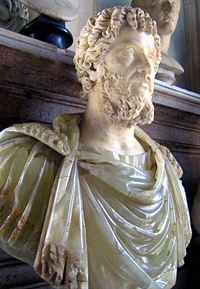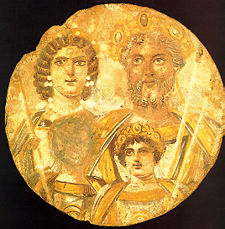Septimius Severus
| Septimius Severus | |
| Emperor of the Roman Empire | |
|---|---|
 |
|
| Alabaster bust of Septimius Severus, at Musei Capitolini, Rome |
|
| Reign | April 14 193 - February 197 (in competition with others); February 197-198 (alone); 198 - 209 (with Caracalla); 209 - February 4 211 (with Caracalla & Geta) |
| Full name | Lucius Septimius Severus (from birth to accession); Caesar Lucius Septimius Severus Pertinax Augustus (as emperor) |
| Born | April 11, 145 |
| Birthplace | Leptis Magna (Al Khums, Libya) |
| Died | February 4, 211 (aged 65) |
| Place of death | Eboracum (York, UK) |
| Predecessor | Didius Julianus |
| Successor | Caracalla and Geta |
| Wives | Paccia Marciana, an African woman of Roman origin. Severus and Marciana married around 175 and she died before Severus married Domna. They had no children. Julia Domna |
| Offspring | Caracalla and Publius Septimius Geta |
| Dynasty | Severan |
| Father | Publius Septimius Geta |
| Mother | Fulvia Pia |
| Roman imperial dynasties | |||
| Severan dynasty | |||
 The Severan Tondo |
|||
| Chronology | |||
| Septimius Severus | 193 – 198 | ||
| -with Caracalla | 198 – 209 | ||
| -with Caracalla and Geta | 209 – 211 | ||
| Caracalla and Geta | 211 – 211 | ||
| Caracalla | 211 – 217 | ||
| Interlude: Macrinus | 217 – 218 | ||
| Elagabalus | 218 – 222 | ||
| Alexander Severus | 222 – 235 | ||
| Dynasty | |||
| Severan dynasty family tree Category:Severan Dynasty |
|||
| Succession | |||
| Preceded by Year of the Five Emperors |
Followed by Crisis of the Third Century |
||
Lucius Septimius Severus (or rarely Severus I) (April 11 145/146 - February 4 211) was a Roman general, and Roman Emperor from April 14 193 to 211. He was born in what is now the Libyan part of Rome's historic Africa Province, making him the first emperor to be born in the Roman province of Africa.
Contents |
Life
Rise to power
Septimius Severus was born and raised at Leptis Magna (modern Libya, southeast of Carthage, modern Tunisia, North Africa). Severus came from a wealthy, distinguished family of equestrian rank. Severus was of Italian Roman ancestry on his mothers side and of either Berber[1] or Phoenician[2] [3] ancestory on his fathers. Little is known of his father, Publius Septimius Geta, who held no major political status but had two cousins who served as consuls under emperor Antoninus Pius. His mother, Fulvia Pia's family moved from Italy to North Africa and was of the Fulvius gens, an ancient and politically influential clan, which was originally of plebeian status. His siblings were a younger Publius Septimius Geta and Septimia Octavilla. Severus’s maternal cousin was Praetorian Guard and consul Gaius Fulvius Plautianus.[4]
In 172, Severus was made a Senator by the then emperor Marcus Aurelius. In 187 he married secondly Julia Domna. In 190 Severus became consul, and in the following year received from the emperor Commodus (successor to Marcus Aurelius) the command of the legions in Pannonia.
On the murder of Pertinax by the troops in 193, they proclaimed Severus Emperor at Carnuntum, whereupon he hurried to Italy. The former emperor, Didius Julianus, was condemned to death by the Senate and killed, and Severus took possession of Rome without opposition.
The legions of Syria, however, had proclaimed Pescennius Niger emperor. At the same time, Severus felt reasonable to offer Clodius Albinus, the powerful governor of Britannia who had probably supported Didius against him, the rank of Caesar, which implied some claim to succession. With his rearguard safe, he moved to the East and crushed Niger's forces at the Battle of Issus. The following year was devoted to suppressing Mesopotamia and other Parthian vassals who had backed Niger. When afterwards Severus declared openly his son Caracalla as successor, Albinus was hailed emperor by his troops and moved to Gallia. Severus, after a short stay in Rome, moved northwards to meet him. On February 19, 197, in the Battle of Lugdunum, with an army of 100,000 men, mostly composed of Illyrian, Moesian and Dacian legions, Severus defeated and killed Clodius Albinus, securing his full control over the Empire.
Emperor
Severus was at heart a soldier, and sought glory through military exploits. In 197 he waged a brief and successful war against the Parthian Empire in retaliation for the support given to Pescennius Niger. The Parthian capital Ctesiphon was sacked by the legions, and the northern half of Mesopotamia was restored to Rome.
His relations with the Roman Senate were never good. He was unpopular with them from the outset, having seized power with the help of the military, and he returned the sentiment. Severus ordered the execution of dozens of Senators on charges of corruption and conspiracy against him, replacing them with his own favorites. He also disbanded the Praetorian Guard and replaced it with one of his own, made up of 50,000 loyal soldiers mainly camped at Albanum, near Rome (also probably to grant the emperor a kind of centralized reserve). During his reign the number of legions was also increased from 25/30 to 33. He also increased the number of auxiliary corps (numerii), many of these troops coming from the Eastern borders. Additionally the annual wage for a soldier was raised from 300 to 500 denarii.
Although his actions turned Rome into a military dictatorship, he was popular with the citizens of Rome, having stamped out the rampant corruption of Commodus' reign. When he returned from his victory over the Parthians, he erected the Arch of Septimius Severus in Rome.
According to the sources, however, after 197 Severus fell heavily under the influence of his prefect of praetorium, Gaius Fulvius Plautianus, who came to have the almost total control of most branches of the imperial administration. Plautianus's daughter, Fulvia Plautilla, was married to Severus's son, Caracalla. Plautianus’s excessive power came to an end in 205, when he was denounced by the Emperor's dying brother and killed. The two following praefecti, including the jurist Aemilius Papinianus, received however even larger powers.
Starting from 208 Severus undertook a number of military actions in Roman Britain, including reconstructing Hadrian's Wall and campaigning in Scotland, before falling severely ill in Eburacum (York). He died there on February 4, 211.
Upon his death in 211, Severus was deified by the Senate and succeeded by his sons, Caracalla and Geta, who were advised by his wife Julia Domna. The stability Severus provided the Empire was soon gone under their reign.
Accomplishments
Though his military expenditure was costly to the empire, Severus was the strong, able ruler that Rome needed at the time. He began a tradition of effective emperors elevated solely by the military. His policy of an expanded and better-rewarded army were criticized by his contemporary Dio Cassius and Herodianus: in particular, they pointed out the increasing burden (in the form of taxes and services) the civilian population had to bear to maintain the new army.
Severus was also distinguished for his buildings. Apart from the triumphal arch in the Roman Forum carrying his full name, he also built the Septizodium in Rome and enriched greatly his native city of Leptis Magna (including another triumphal arch on the occasion of his visit of 203).

Severus and Christianity
The reign of Severus provides an interesting example of the persecution meted out to Christians under the Roman Empire. Septimius allowed the enforcement of policies already long-established, which meant that Roman authorities did not intentionally seek out Christians, but when people were accused of being Christians they could either curse Jesus and make an offering to Roman gods, or be executed. Furthermore, wishing to strengthen the peace by encouraging religious harmony through syncretism, Severus tried to limit the spread of the two quarrelsome groups who refused to yield to syncretism by outlawing conversion to Christianity or Judaism. Individual officials availed themselves of the laws to proceed with rigor against the Christians. Naturally the emperor, with his strict conception of law, did not hinder such partial persecution, which took place in Egypt and the Thebaid, as well as in Africa proconsularis and the East. Christian martyrs were numerous in Alexandria (cf. Clement of Alexandria, Stromata, ii. 20; Eusebius, Church History, V., xxvi., VI., i.). No less severe were the persecutions in Africa, which seem to have begun in 197 or 198 (cf. Tertullian's Ad martyres), and included the Christians known in the Roman martyrology as the martyrs of Madaura. Probably in 202 or 203 Felicitas and Perpetua suffered for their faith. Persecution again raged for a short time under the proconsul Scapula in 211, especially in Numidia and Mauritania. Later accounts of a Gallic persecution, especially at Lyon, are legendary. In general it may thus be said that the position of the Christians under Septimius Severus was the same as under the Antonines; but the law of this Emperor at least shows clearly that the rescript of Trajan had failed to execute its purpose.
Notes
- ↑ "Berbers : ... The best known of them were the Roman author Apuleius, the Roman emperor Septimius Severus, and St. Augustine", Encyclopedia Americana, Scholastic Library Publishing, 2005, v.3, p.569
- ↑ "UNRV article"http://www.unrv.com/decline-of-empire/septimius-severus.php
- ↑ "The Roman-Empire.net"http://www.roman-empire.net/decline/decl-index.html
- ↑ Dio Cassius "Roman History, Volume IX, Books 71-80" ISBN 0674991966 Full text
References
- Anthony Birley. Septimius Severus: The African Emperor, 1998. ISBN 0-415-16591-1
- Michael Grant. The Roman Emperors, 1985. ISBN 0-760-70091-5
- Michael Grant. The Severans: The Changed Roman Empire, 1996. ISBN 0-415-12772-6
- Continuité gentilice et continuité sénatoriale dans les familles sénatoriales romaines à l'époque impériale, 2000
External links
- Scotia Invicta Account of the Severan expeditions in Scotland
- Life of Septimius Severus (Historia Augusta at LacusCurtius: Latin text and English translation)
- Books 74, 75, 76, and 77 of Dio Cassius, covering the rise to power and reign of Septimius Severus
- De Imperatoribus Romanis Online encyclopedia of Roman Emperors
- Arch of Septimius Severus in Rome
- Arch of Septimius Severus in Lepcis Magna
- Coins issued by Septimius Severus
 "Septimius Severus". Catholic Encyclopedia. (1913). New York: Robert Appleton Company.
"Septimius Severus". Catholic Encyclopedia. (1913). New York: Robert Appleton Company.
| Preceded by Didius Julianus |
Roman Emperor 193–211 at first in competition with Pescennius Niger and Clodius Albinus with Caracalla (198–211) and Geta (209–211) |
Succeeded by Caracalla and Geta |
|
|||||||||||||||||||||||
| Persondata | |
|---|---|
| NAME | Severus, Septimius |
| ALTERNATIVE NAMES | Lucius Septimius Severus |
| SHORT DESCRIPTION | Roman emperor |
| DATE OF BIRTH | April 11 146 |
| PLACE OF BIRTH | Leptis Magna |
| DATE OF DEATH | February 4 211 |
| PLACE OF DEATH | Eboracum |